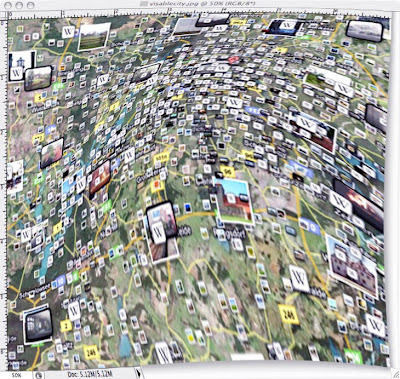
I have just realized that being a Fine Artist in New York City means that you really are a small fashion business entrepreneur, the networking, the partying, the social conformity are all part of being an artist, or at least becoming one. Which apparently being an art is making a living from one small fashion business (or artwork). Quality is a piece of the business, but like most business it is all about numbers, which takes priority over the quality or concept of the product. I am going to market my small fashion business to 99cent stores, I believe there can a be a considerable amount of profit to be had in the 99cent store setting, So I present to you, "Artsy".
Camouflage City


Steven Chu
Ph.D (born February 28, 1948),[3] is an American physicist and currently the 12th United States Secretary of Energy. As a scientist, Chu is known for his research in cooling and trapping of atoms with laser light, which won him the Nobel Prize in Physics in 1997.[3] At the time of his appointment as Energy Secretary, he was a professor of physics and molecular and cellular biology at the University of California, Berkeley and the director of the Lawrence Berkeley National Laboratory, where his research was concerned primarily with the study of biological systems at the single molecule level.[1] He is a vocal advocate for more research into alternative energy and nuclear power, arguing that a shift away from fossil fuels is essential to combat global warming.[4][5][6]
Being
On the first page of Being and Time, Heidegger describes the project in the following way: "our aim in the following treatise is to work out the question of the sense of being and to do so concretely."[2] Heidegger claims that traditional ontology has prejudicially overlooked this question, dismissing it as overly general, undefinable, or obvious.[3]
Instead Heidegger proposes to understand being itself, as distinguished from any specific entities.[4] "'Being' is not something like an entity."[5] Being, Heidegger claims, is "what determines entities as entities, that in terms of which entities are already understood."[6] Heidegger is seeking to identify the criteria or conditions by which any specific entity can be at all.[7]
If we grasp being, we will clarify the meaning of being, or "sense" of being ("Sinn des Seins"), where by "sense" Heidegger means that "in terms of which something becomes intelligible as something."[8] According to Heidegger, as this sense of being precedes any notions of how or in what manner any particular being or beings exist, it is preconceptual, nonpropositional, and hence prescientific.[9] Thus, in Heidegger's view, fundamental ontology would be an explanation of the understanding preceding any other way of knowing, such as the use of logic, theory, specific ontology[10] or act of reflective thought. At the same time, there is no access to being other than via beings themselves—hence pursuing the question of being inevitably means asking about a being with regard to its being.[11] Heidegger argues that a true understanding of being can only proceed by referring to particular entities, and that the best method of pursuing being must inevitably, he says, involve a kind of hermeneutic circle, that is (as he explains in his critique of prior work in the field of hermeneutics), it must rely upon repetitive yet progressive acts of interpretation. "The methodological sense of phenomenological description is interpretation."[12]
Dasein
Thus the question Heidegger asks in the introduction to Being and Time is: what is the entity that will give access to the question of the meaning of being? Heidegger's answer is that it can only be that entity for whom the question of being is important, the entity for whom being matters.[10] As this answer already indicates, the entity for whom being is a question is not a what, but a who. Heidegger calls this entity Dasein (an ordinary German word meaning, roughly, "(human) existence" or, more literally, "being-there"), and the method pursued in Being and Time consists in the attempt to delimit the characteristics of Dasein, in order thereby hopefully to approach being itself. The word "Dasein" does not have the same sense or connotation as the word "man" (Mensch), but what it refers to is the same entity, namely the human being. Being and Time is not concerned not with a metaphysical account of man, but with the existential conditions that make the question of being intelligible. This is why Heidegger claims that Being and Time is not philosophical anthropology.
Heidegger's account of Dasein passes through a dissection of the experiences of Angst and mortality, and then through an analysis of the structure of "care" as such. From there he raises the problem of "authenticity" (Eigentlichkeit), that is, the kind of resolute "owning" of one's life and experience that best exposes one's existence for what it is, namely groundless thrown projection into future possibilities that are essentially fragile and ultimately closing down in death. Heidegger insists that "authenticity" is a merely descriptive, value-neutral term, but it is obvious that it denotes something desirable or choice-worthy.
Time
Finally, this question of the authenticity of individual Dasein cannot be separated from the "historicality" of Dasein. On the one hand, Dasein, as mortal, is "stretched along" between birth and death, and thrown into its world, that is, thrown into its possibilities, possibilities which Dasein is charged with the task of assuming. On the other hand, Dasein's access to this world and these possibilities is always via a history and a tradition—this is the question of "world historicality," and among its consequences is Heidegger's argument that Dasein's potential for authenticity lies in the possibility of choosing a "hero."
Thus, more generally, the outcome of the progression of Heidegger's argument is the thought that the being of Dasein is time. Nevertheless, Heidegger concludes his work with a set of enigmatic questions foreshadowing the necessity of a destruction (that is, a transformation) of the history of philosophy in relation to temporality—these were the questions to be taken up in the never completed continuation of his project:
The existential and ontological constitution of the totality of Dasein is grounded in temporality. Accordingly, a primordial mode of temporalizing of ecstatic temporality itself must make the ecstatic project of being in general possible. How is this mode of temporalizing of temporality to be interpreted? Is there a way leading from primordial time to the meaning of being? Does time itself reveal itself as the horizon of being?[13]

I don't know exactly why I do art.
Art, for the most part is just a social exchange.
So what sense does it make to exchange with
just myself. Communication over Form,
the group over the individual.
The Dastardly group, of scumbags and villains.
Look at Micheal Jackson, he is dead now.
And finally has been forgiven for being a human being.
Look at us, Look at yourself whomever is reading this
and feel terrible for ridiculing an individual who
devoted himself to you.
Morning means feeling sad. Sadness doesn't equal
going and getting coked up and having sex with a stranger,
at a party. We are a disgust bunch. Ahmadinejad deserves
to become president of Iran, and He should pull a Travis Bickle on this
whole country like the whore house it is.
We are a worthless and Godless group.
So America feel sad feel very sad.
Micheal Jackson is dead.












































